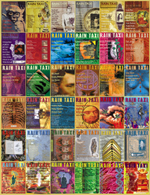LANGUAGE IS
John Phillips Sardines Press ($10) by Richard Owens British poet John Phillips's latest collection, Language Is, is evidence of the consanguinity his work shares with American

John Phillips Sardines Press ($10) by Richard Owens British poet John Phillips's latest collection, Language Is, is evidence of the consanguinity his work shares with American
Kevin Stein University of Illinois Press ($16.95) by Jean-Paul Pecqueur In a world where life is transitory and contingent, loss is inevitable. This is one
Brian Turner Alice James Books ($14.95) by Joel Turnipseed Several hundred books have now been published on the Iraq War—some quite good, e.g. Generation Kill, One Bullet
Kenneth Koch Alfred A. Knopf ($40) by Tim Keane If Kenneth Koch had an artistic credo it was play hard at poetry. Play hard he did,
by Robert J. Nebel Al Franken is a powerhouse. This prolific 54-year-old satirist never seems to tire. Author of some of the most well-known political
by Mary Kite I'm in Los Angeles riding around downtown with poet Lewis MacAdams, who is also chairman and founder of Friends of the Los
by Astrid Jaida Kane Faucher was born in Ottawa in 1977. The author of two novels, Urdoxa (2004) and Codex Obscura (2005), which contains an introduction by Raymond
by Allan Vorda There has always been an interest in society's "oldest profession," yet despite our fascination with prostitution, for most people it's a life

Tracy Quan, Kane X. Faucher, Al Franken, Lewis MacAdams, and more...